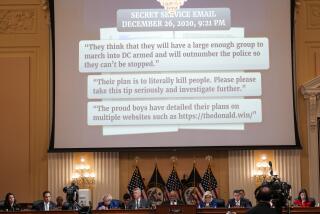Leveling With Congress
- Share via
A President who wants to order a covert intelligence operation is required in almost every case to tell appropriate members of Congress about it in advance. If for some good national-security reason prior notification isn’t feasible, the President is supposed to give Congress “timely notice” about what he is up to. “Timely,” though, is left undefined, and that ambiguity offers ample scope for evading the spirit if not the letter of the law. After President Reagan approved secret arms sales to Iran in 1985, he let 14 months go by before bothering to tell Congress what he had ordered.
Some of those who were involved in the misbegotten effort to trade arms to Iran for American hostages in Lebanon later claimed that Congress had to be kept in the dark because it couldn’t be trusted to keep the matter secret. This argument fell apart as it came to be learned how senior Administration officials were also misled and lied to about what was going on. In fact, had appropriate members of Congress been told about what was being contemplated, had wiser counsel been sought and had the system of checks and balances been allowed to work, one of the dumber political blunders of modern times would almost certainly have been stopped dead.
The President has since acknowledged that mistakes were made. It’s for this reason that he has now written to Sen. David L. Boren (D-Okla.), chairman of the Select Intelligence Committee, proposing new procedures for keeping those who should know properly informed about covert operations. Two of Reagan’s points are of particular importance. The first is his commitment to let Congress know within 48 hours in most cases when a covert operation has begun--a useful substitute for the vague “timely notice” provision of current law. Also, Reagan pledges to keep all members of the National Security Council informed in writing about the details of covert operations. The purpose here is to prevent what Boren calls a “palace coup” by NSC staff members, of the kind that saw underlings withhold information of major national importance from statutory members of the NSC.
Intelligence Committee leaders have generally welcomed Reagan’s proposals, but with a certain caution. Rather than depending on presidential authority alone for the enforcement of these ideas, the senators would prefer to see them nailed down in statutory law. That may not be what Reagan wants, but because of what he and his subordinates did it’s almost certainly what he will get.
More to Read
Get the L.A. Times Politics newsletter
Deeply reported insights into legislation, politics and policy from Sacramento, Washington and beyond. In your inbox twice per week.
You may occasionally receive promotional content from the Los Angeles Times.










